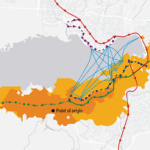Posts tagged with 'Eric Mackres'
For years, city governments in the United States have taken the lead on committing to climate action, with more than 165 cities aiming for 100% community-wide clean energy. But whether ambitious goals translate to ambitious action is another question altogether, and ...

Between the 1918 flu pandemic and the 2020 COVID-19 crisis, our ability to understand the effects of infectious diseases has increased exponentially. Networked personal devices and automated sensors are now ubiquitous, not to mention communications technologies like the internet that ...

Getting to a net-zero-carbon energy system is essential. It will be a major effort, one that requires significant investment in new low-carbon infrastructure, from renewable power plants to electric vehicles, efficient appliances and better constructed buildings. While very few countries are on track, China, Costa ...

Among cities with the highest rates of outward expansion are coastal cities that are extremely vulnerable to flooding from sea level rise and storm surges. Map by Resource Watch Urban expansion and sea level rise are combining to increase the ...

Tamil Nadu state in south India suffers from seasonal extremes in water availability. Sometimes there is too much water, and in other seasons not enough. Chennai, the coastal capital of 10 million people, experienced a “Day Zero” crisis this summer, ...

Summertime often means soaring, dangerous temperatures. Recent heat waves in Europe brought government warnings, power plant shutdowns, restrictions on automobile use, heat stroke and deaths. But misery in Europe and elsewhere is compounded by the chemistry of how emissions from ...

The previous Map of the Month showed the power of accessibility data – comparing average travel time to different services in Mexico City – as a proxy to understand inequality in cities. But similar analyses can also help us to ...

Cities are currently both climate-culprit and climate-victim. They are already responsible for 70 percent of global energy-related greenhouse gas emissions and 65 percent of global energy demand; they could easily account for more than three-quarters of electricity use by 2030. ...

Building efficiency is one of the most effective and affordable solutions for addressing climate change and capping carbon emissions. Yet it is so often drowned by discussions of electric vehicles and solar panels. Given that better buildings are a great ...

About 3 billion people, or 40 percent of the world’s population, will need new housing by 2030. That will require constructing approximately 21 million new homes every year across the world. Several of the fastest-growing countries have ambitious goals to ...

The 2017 Sustainable Energy for All Forum kicked off with a stark warning: The world is not on track to reach its 2030 energy goals, including those on efficiency. To speed action, leaders in government and finance will need to ...

One-third of the world’s energy-related emissions come from buildings. So perhaps it’s no surprise that more than 80 national climate plans submitted ahead of COP21 in Paris included commitments to improve building efficiency. A year later, the discussion continues with Human Settlements Day today at COP22 in ...

Facing environmental vulnerabilities like increasingly high temperatures, more frequent storm surges and a rising sea level, small island states have long been on the front lines of the fight against climate change. This existential threat has made some of the ...

Urbanization presents major challenges: congestion, sprawl, inefficiency, health hazards and high cost of living, just to name a few. But the choices we make for our cities can transform these challenges into opportunities: mobility, connectivity, economies of scale, healthier lifestyles ...

Are you involved with decision making, operations or investments in the buildings and real estate sector? If the answer is yes, WRI Ross Center for Sustainable Cities invites you to please share your insights in a survey designed to expand ...




























